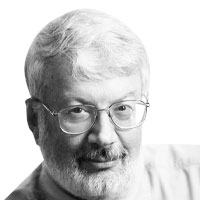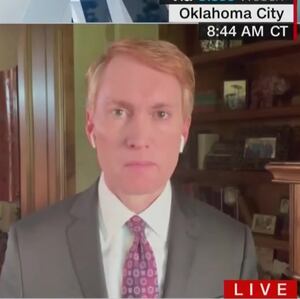The executive director of the Tulsa County Health Department believes that Donald Trump’s rally at the BOK Center scheduled for Saturday, June 20 could be a public health catastrophe.
“Regardless who is hosting this rally, we would recommend you not attend large events,” said Dr. Bruce Dart during an interview on Saturday, June 13. “If you want to stay safe, don’t go.”
Dart said that he spoke to Tulsa Mayor G.T. Bynum – whom he described as a “good mayor who has done the right things since the pandemic hit” – on Saturday night. He urged Bynum to “postpone the event until it’s safe for large crowds to gather indoors,” he said.
Last week Trump announced that he was coming to Tulsa for his first campaign rally since the COVID-19 outbreak. The event was originally scheduled for Friday, June 19, but he immediately got pushback because that is Juneteenth—the date in 1865 when Union Army Maj. Gen. Gordon Granger emancipated slaves in Galveston, Texas, the last state to free its slaves. African Americans celebrate Juneteenth as a “second independence day.” Trump initially resisted calls to reschedule the rally but on Saturday he capitulated, agreeing to delay it by one day.
Trump was also criticized for bringing his rally–whose boisterous crowds are typically overwhelmingly white and conservative–to a city with a particularly harsh history of racism. Tulsa was the site of one of the worst incidents of white mob violence–which local residents and historians now describe as a massacre–in American history.
In May 1921, a white mob destroyed Tulsa’s Greenwood District, a flourishing black business and residential area known as "Black Wall Street." Thirty-five city blocks were burned, over 800 people were injured, between 150 and 300 people died, and as many as 10,000 black Tulsans were left homeless, according to historians.
During the 1920s, the Ku Klux Klan played an active role in Tulsa politics, with over 3,000 members in a city of 70,000. Tulsa is now a booming city of 400,000 (650,000 in the county), but still plagued with problematic race relations. The poverty rate among Tulsa’s black population is 34 percent, compared with 13 percent among white Tulsans.
The city’s black residents, who comprise 15 percent of Tulsa’s population, are highly concentrated in predominantly black areas, according to a report by Human Rights Watch. They are 2.3 times more likely to be arrested than white residents, the report documented.
The city was in an uproar last week after two Tulsa police officers arrested a black teenager and handcuffed a second for jaywalking. A video shows an officer forcing one of the teenagers onto his stomach to handcuff him, while holding him down with his arms and knees. The incident is currently under investigation.
The police department faced another controversy after Tulsa Police Major Travis Yates told a conservative talk radio host on June 8 that systematic racism doesn’t exist and that "we're shooting African Americans about 24 percent less than we probably ought to be based on the crimes being committed." The police chief Wendell Franklin, an African American, and Mayor Bynum, who is white, denounced Yates’ comments. The police department’s Internal Affairs Unit is investigating.
Trump is virtually certain to win Oklahoma’s seven Electoral College votes in November. In 2016, he won 65 percent of the votes in the state, and 58 percent of votes in Tulsa County, so he isn’t coming to the city to win over voters in a must-win swing state.
Combining the original date, the notorious history, and the fact that Oklahoma is not a swing state, critics viewed Trump’s decision to hold the rally in Tulsa as insensitive at best, and intentionally inflammatory at worst, particularly in the midst of a national uprising over the recent murder of George Floyd by Minnesota police and the broader outrage over police racism.
"This isn't just a wink to white supremacists," tweeted Senator Kamala Harris (D-CA) on Thursday. "He's throwing them a welcome home party."
Those controversies have diverted attention from the public health dangers posed by a large indoor rally.
Oklahoma was one of the first states to reopen its economy, beginning with some businesses as early as April 24, a move that Dr. George Monks, president of the Oklahoma State Medical Association, called “premature” and “hasty.” Since Gov. Kevin Stitt completely reopened Oklahoma to business on June 1, the state and Tulsa—Oklahoma’s second largest metropolitan area—have seen a significant spike in COVID-19 cases.
According to data on the Tulsa County Health Department website, and confirmed by Dr. Dart, as of June 12, Tulsa County has seen 1,525 cases and 62 deaths from the virus since March 6. More than 500 of those cases emerged since June 1 -- with 82 new cases reported on Friday alone, the most one-day new cases since the virus outbreak began. As of June 1, the county had a seven-day rolling average of 17.4 new cases. This represents data from the week before the June 1 re-opening. As of June 12, this figure surged to 51.4 new cases.
“Up until June 1, we were seeing a flattening of the curve,” Dr. Dart noted. “But after that, we’ve seen significant increases” of virus cases. “People aren’t taking the same precautions that they were before.”
Once the governor lifted all restrictions, Dr. Dart said, an increasing number of people stopped wearing masks, stopped staying home, went shopping, and participated in social gatherings. “I think it is a matter of quarantine fatigue,” he said.
Dr. Dart was caught off guard by the announcement of Trump’s plan to hold a rally at the BOK Center, an arena that seats over 19,000 people and hosts the Tulsa Oilers minor-league hockey team and many concerts by big-name artists. He first learned about it on Twitter.
The BOK Center–which is owned by the city, managed by ASM Global, a private company, and named for the Bank of Oklahoma, which purchased the naming rights–has been closed for events since March “out of an abundance of caution,” according to the venue’s website. Concerts by Kiss, Alan Jackson, Justin Bieber, Bon Jovi, Sturgill Simpson, Toby Mac, and other artists were cancelled or postponed, as was a Harlem Globetrotters basketball exhibition and the rest of the Oilers’ season.
According to the City of Tulsa website, the city has to grant a permit for any event at the BOK Center. A spokesperson for ASM Global, which manages the BOK Center, did not respond to a question about whether the Trump campaign or the BOK Center applied for or was issued a permit for the rally.
Michelle Brooks, press secretary to Mayor Bynum, said she was on furlough and not supposed to be working, but pointed to certain press accounts and a statement the mayor posted on Facebook, which reads in part: “The City of Tulsa continues to follow the State of Oklahoma’s OURS plan on COVID-19 response as it relates to events, which encourages the organizer to have enhanced hygiene considerations for attendees. In Tulsa, we protect the free and peaceful exchange of ideas. We did it during the last two weeks of protests, and we will do it during the President’s visit to Tulsa next week. We will also continue to follow the State of Oklahoma’s guidelines for a safe reopening.”
Bynum, a Republican, has said that he will not attend the rally but will greet the president when he arrives, “as a mayor should any time a sitting president visits their city.”
During the interview, Dr. Dart, who is appointed by the county board of health and considers his position apolitical, said, “I don’t care what the event is. I’m concerned about an event with a lot of people in closed spaces.” He added: “Large indoor gatherings are a danger to the public during the pandemic.”
The health official said that he had heard from BOK Center staffers that the Trump event organizers had hired a private firm to conduct temperature tests before people will be allowed to enter the arena. He also heard that the event staff will have masks available to those who want them but will not require them to wear masks.
A Trump campaign spokesman did not respond to a Sunday morning email requesting a response to Dr. Dart’s remarks and information about whether a permit had been obtained and what precautions, if any, the campaign is taking to protect people who attend the rally.
Trump has refused to wear a mask throughout the pandemic, even during meetings and gatherings where he is in close contact with others. On Friday, Brad Parscale, Trump’s campaign manager, tweeted that he was “looking at a 2nd event in town to get more people to be w/@realDonald Trump.”
What would Dr. Dart say to someone who was thinking of attending the Trump rally? “If you want to stay safe, don’t go,” said Dr. Dart, who has a Ph.D. in public health and formerly served as president of the National Association of County and City Health Officials. “All we want to do is protect people and save lives.”
Dart’s comments are in sync with the current federal Centers for Disease Control and Prevention guidelines, which warn that "large events and mass gatherings can contribute to the spread of COVID-19" and encourage event organizers "to prepare for the possibility of outbreaks in their communities."
The Trump campaign is requiring people to sign a waiver and "assume all risks related to exposure to COVID-19" before being allowed into the Make America Great Again rally at the BOK Center. Trump’s followers must “agree not to hold Donald J. Trump for President, Inc.” as well as the arena, “liable for any illness or injury,” according to the registration form on Trump’s official 2020 campaign website.
Trump has been trying to find another city to host the Republican convention, scheduled for late August in Charlotte, because North Carolina Gov. Roy Cooper, a Democrat, has refused to relax prohibitions on large indoor gatherings.
Peter Dreier is professor of Politics and chair of the Urban & Environmental Policy Department at Occidental College.






